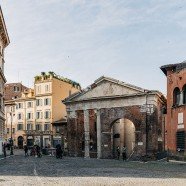
3-hour walking tour
kid-friendly tour
Discover the first public museum in history and the fascinating Jewish quarter, with a pleasant tasting at the end of the tour.
The Capitoline Museums, established in 1471, were the first public museum in history, thanks to Pope Sixtus IV's donation of bronzes. The collection includes iconic works like the Capitoline Wolf. Enriched in the 18th century, it offers a dialogue between art and the Capitoline Palaces' architectural context in Piazza del Campidoglio. The itinerary starts from the Conservators' Apartment, moves to the exedra of Marcus Aurelius, and includes views of the temple of Jupiter Optimus Maximus and the Roman Forum towards the Tabularium gallery.
We will continue our walk in the Jewish quarter: from the Synagogue to the Square of the Cinque Scole, from the Theatre of Marcello and the Porticus Octaviae to the Turtle Fountain in Piazza Mattei. The itinerary will end in the middle of the Tiber Island, crossing the city river and enjoying a panoramic view of the area; a journey in the history and memory, to find out curious facts and legends. We will end our tour with food tastings of the typical local specialities, such as the artichoke “alla giudia”, the famous tart with sour cherry jam, local bakery products and much more.
Some of the most representative pictures of this tour
Discover the main stops of this tour

Also known as Colle Campidoglio, it is one of the seven hills of Rome. Famous nowadays both for the role it had in ancient Roman times and for an important intervention carried out by Michelangelo, who turned the hill into one of the most beautiful piazzas in Italy. From the Capitoline hill, you’ll have the chance to enjoy a spectacular view over the Roman Forum.

The Jewish Quarter is one of the most beautiful areas in the city, which includes many beauties. This district is famous for the "carciofi alla giudia" (fried artichokes), one of the main dishes of Roman-Jewish cuisine. No visit to the Jewish quarter would be complete without a taste of them!

This famous open-air theatre was built in the closing years of the Roman Republic and was the largest and most important theatre in Ancient Rome. Begun by Julius Caesar, it was completed by Augustus in 13 BC with a dedication to Augustus’s nephew, Marcus Claudius Marcellus. Estimates of the theatre’s seating capacity range from 11,000 to 40,000.

Located in the southern bend of the Tiber, it is associated with medicine and healing, being a seat of the ancient temple of Asclepius and later a hospital. Since antiquity, the island has been linked to the rest of Rome by two bridges: the Ponte Fabricio, the only original bridge in Rome, and the Ponte Cestio, of which only some original parts survived.
Some useful information for your experience
Expert and licensed guide, entrance ticket, tasting, full on-site assistance, sterilized earphones (from 5 people upwards).
Suggested start time: 9.30 am / 2.00 pm. Not available on Saturday, Friday pm and during the Jewish celebrations.